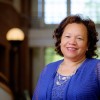This article is more than 5 years old.
Arriving in Seattle after a very early departure from Greensboro and a long, long flight my first day was totally exhausting. Before calling it a day, I managed to hear and enjoy the opening keynoter Rush Kidder and agree with him when he states, a lot of what’s wrong with America could be fixed with an ethical bailout. A very nice dinner with John Reynolds of Serial Solutions and a few of their other customers followed and went on well into the evening despite the fact that my biological clock was stuck on eastern.
Friday morning I was all refreshed and ready to hear about ACRL trends. The session titled “Brother Can You Spare a Dime? featured a four member panel presentation with each offering insights on the “ACRL 2009 Strategic Thinking Guide for Academic Librarians in the New Economy.” You can find that document here:
http://www.acrl.org/ala/mgrps/divs/acrl/issues/future/acrlguide09.pdf The three main drivers of this document are the economy and higher education, changing student demographics and advances in information technology. One of the panelist Debra Gilchrist, Dean of Libraries and Institutional Effectiveness, Pierce College advised Librarians to totally rethink what we do so we become prepared to face transformation rather than just muddling thru, switching from service to engagement and looking at our role in overall student success.”Playing on “Practice Fields”: Creating a Research and Development Culture in Academic Libraries, featured Craig Gibson of George Mason University who listed the following as reasons to investigate research and development practices; it identifies models for innovation, positions academic librarians for opportunities to collaborate and allows them to invest in their futures. He ask the audience, how many libraries have a department dedicated to following the users every move and relating them to desired outcomes. Gibson advised libraries to conduct research as an organizational strategic focus and to partner with the university’s institutional assessment team.
Cara Bradley’s discussion entitled, “Beyond Campus Disconnect: Academic Libraries and the Information Needs, Skills and Behaviors of Non-teaching Staff,” shared results of a University of Regina survey administered to their non-teaching staff. The survey had specific focus areas; information needs, library knowledge and use demographics. Results supported higher levels of need but a reluctance to get it from the library. Campus administration and staff need the work of libraries because the knowledge they gain ensures better decision making, provides time saving techniques and reduces stress. Libraries on the other hand need them because they become some of our best advocates.
After attending our own current survey administrator (Counting Opinion’s) users’ group meeting, I came away just like I did last year feeling like the world of assessment was right at my fingertips, ready available, fully customizable and easily manipulated. I just hope this time what I experience working with the survey and the administrators will support my excitement. InformUs, one their newest features promises to track, manage and route customer .feedback within categories to the appropriately designated contacts.
One of my last discussions of the day was appropriately named “Telling Our Story – or Not: Assessment Results on Academic Library websites.” Here, Meg Scharf of the University of Central Florida ask if we prove to our users that we are listening to them. Is our performance information located on our website?
Is it easy to find? Does it show old outdated data. A survey of 250 randomly selected library websites were reviewed and graded on the above listed criteria. The results were somewhat troubling as only 5% received grade A meaning they had data linked to objectives, 16% had a B grade meaning they had somewhat of a clear path, 16% a grad of C meaning they had some data but it was mostly outdated and a whopping 73% received an F grade meaning they couldn’t find any data present on their website. Scharf encouraged Librarian in the audience to tell their story because it is so important. Our users can be our best advocates.
